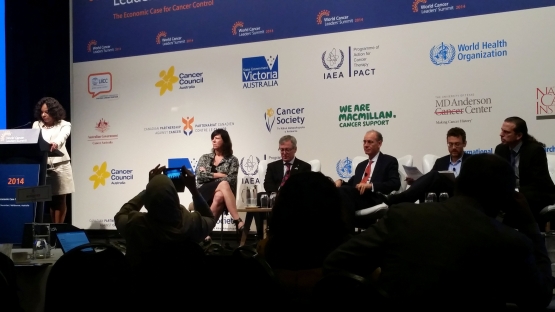The World Cancer Leaders' Summit brings together key decision makers from around the world and encourages debate on emerging issues related to cancer. The event aims at raising awareness among leading decision makers to ensure cancer is a global health priority. It also provides a forum to exchange information and innovative ideas on how to reverse the cancer epidemic and ensure a sustainable response.
The 2014 Summit organized by the Union for International Cancer Control (UICC) took place in Melbourne, Australia, on December 3, 2014. As in previous years, the IAEA was one of the major partners along with the International Agency for Research on Cancer (IARC) and the World Health Organization (WHO). 250 high-level participants attended the event, including representatives from the other UN agencies, national ministries, international cancer organizations and private sector leaders. The overarching theme of the 2014 Summit was the Economic Case for Cancer Control, which focused on the economic and social benefits of addressing the disease.
Ms Nelly Enwerem-Bromson, Director PACT, with the UICC President Ms Mary Gospodarowicz co-chaired the panel discussion, which provided evidence-based arguments for investment in radiotherapy (RT).
Ms Enwerem-Bromson stressed that radiotherapy is an essential component of comprehensive cancer care. She emphasized that the proportion of cancer patients which would require RT during the course of their treatment is 50% to 60% and that this indicator can be even higher for low and middle income (LMI) countries due to the advanced nature of the cancers and the limited access to opioids for palliation. Yet, while access to radiotherapy is taken for granted in many high income countries, the picture is heartbreakingly different in the developing world. Currently, there are more than 30 countries without a single radiotherapy service, most of them in Africa. To address the limited access to RT in LMI countries, the IAEA/PACT through the Advisory Group on Access to Radiotherapy Technology (AGaRT) has been working together with regional experts and RT equipment manufacturers with an aim to provide concrete advice to countries that are embarking on the process of establishing or expanding their radiotherapy services.
Subsequently, it was highlighted that radiotherapy is one of the most cost-effective modalities of cancer therapy. To support this argument, the panel listed a number of reasons. Firstly, the majority of RT patients are treated as outpatients and do not need hospitalization. Secondly, the equipment has high throughput of patients - with the machines in LMI countries treating more patients than in developed countries. In addition, equipment has a relatively long life cycle, ranging on average from 10 to 15 years. Thus, the actual cost of a radiation treatment course per patient is rather low.
To conclude, the panelists appealed to the policy-makers to increase investments in radiotherapy as a proven technology in cancer treatment and palliation as well as highlighted the importance of defining a global investment target for radiotherapy in the near future. It was emphasized that investments in RT bring drastic marginal returns in survival rates in LMI countries and that access to RT as an essential part of comprehensive cancer control approach has to be a priority for the international community.
Along the World Cancer Leaders' Summit, the World Cancer Congress, hosted by Cancer Council Australia, was held in Melbourne. The theme for the 2014 Congress closely followed the Summit theme and ran as 'Joining Forces - Accelerating Progress'. The Congress highlighted the need for more concrete and concerted action at a global scale to achieve the UN goal of reducing premature deaths from cancer and the other NCDs by 25% by 2025.


